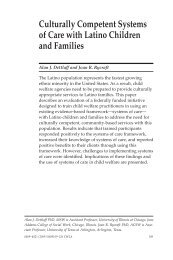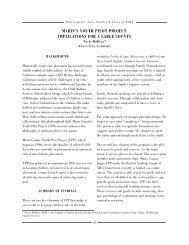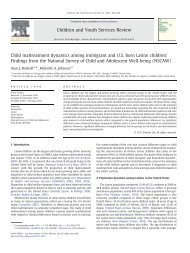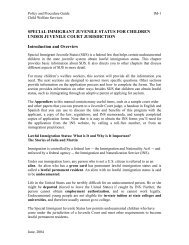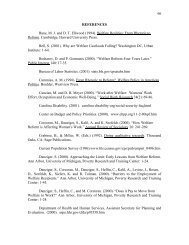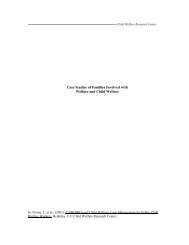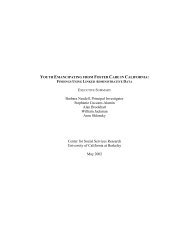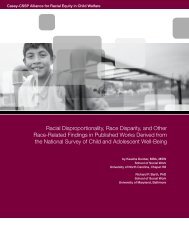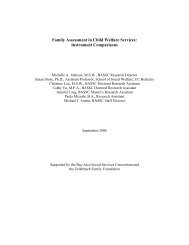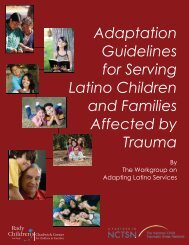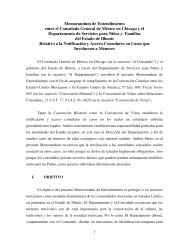CHAPTER 2: METHODOLOGY FOR DEVELOPING ACLAS SELF-ASSESSMENT TOOLThis chapter describes the methodology which guided the redesign <strong>of</strong> the CLAS inMCOs study instruments to be appropriate for implementation in LPHAs. A review <strong>of</strong> theliterature, lessons learned from the CLAS in MCOs study, and recommendations <strong>of</strong> theproject’s two advisory groups are described.2.1 LITERATURE REVIEWThe CLAS in LPHAs project adopted the conceptualization <strong>of</strong> CLAS, along with theessential components identified in the CLAS in MCOs study (OMH 2003b). Thefollowing sections briefly revisit the literature which was reviewed to identify how CLASwas defined in the health care field to date and revisit the available definitions anddescriptive components <strong>of</strong> CLAS. The literature review provided a knowledge base fromwhich modifications to the MCO instruments were made to be more appropriate forLPHAs.2.1.1 Defining LPHAsIn 1977, C. Arden Miller and colleagues described an LPHA as “an administrativeand service unit <strong>of</strong> local or state government, concerned with health, employing at leastone full-time person, and carrying some responsibility for health <strong>of</strong> a jurisdiction smallerthan a state.” NACCHO later refined Miller’s definition by excluding the “one full-timeperson,” as this is not necessarily the case in all LPHAs (1990). LPHAs vary injurisdiction size, organization, composition, and services <strong>of</strong>fered, yet all are publiclyfunded and concerned with community health. Populations served can range from under25,000 to over a million people. Most LPHAs are county-based, while the remainingserve town, city, regional, or city-county jurisdictions (NACCHO 2001; Public HealthPractice Program <strong>Office</strong> 1991). While specific services vary by agency, services mostcommonly include immunizations, communicable disease testing and control, health andcommunity education, environmental health services, and food safety and restaurantinspection. Public health encompasses many disciplines and services, however the overallfocus <strong>of</strong> all public health is the welfare <strong>of</strong> populations or communities (Association <strong>of</strong>Schools <strong>of</strong> Public Health 1990, IOM 1988). For example, the Seattle health departmentprovides primary care, while Cleveland’s health department focuses more on populationbasedservices (McHugh et al. 2001).LPHAs serve as a safety net for the underserved, i.e., the uninsured, low-income,persons with LEP, immigrants, and racial and ethnic minorities (Felt-Lisk et al. 2001;COSMOS Corporation, December 2003 2-1
Public Health Practice Program <strong>Office</strong> 1991). This population faces significant barriers toaccessing quality health care, because studies have shown racial and ethnic minorities andpeople who are LEP are more likely to lack health insurance than English speakers (TheHenry J. Kaiser Family Foundation 2003; Smedley et al. 2002). Consequently, studieshave documented how the uninsured have greater difficulty accessing health care thanthose who have insurance (Felt-Lisk et al. 2001).2.1.2 Provision <strong>of</strong> CLAS in LPHAsTitle VI <strong>of</strong> the Civil Rights Act <strong>of</strong> 1964 prohibited discrimination based on race,color, and national origin in programs that receive federal funding, and Executive Order13166 <strong>of</strong> 2000 went further, to require that federally funded programs be made accessibleto those who are not pr<strong>of</strong>icient in English. This order includes LPHAs which receivefunding from the federal government. Based on these requirements and other research,OMH issued a set <strong>of</strong> recommended national CLAS standards developed under anotherproject (Federal Register 2000), which may guide LPHAs in developing their ownstandards.LPHAs are aware <strong>of</strong> the increasing need for CLAS provision and strive to ensure thattheir clients’ needs are met. Some LPHAs have formed committees to investigate theircommunities’ needs (Interpreter Standards Advisory Committee 1998). For instance, theWashington State Department <strong>of</strong> Health has produced a report describing a formalizedtraining process for cultural awareness, changes in federal and state systems, and currentefforts to promote CLAS (Washington State Department <strong>of</strong> Health 1995). The ArizonaDepartment <strong>of</strong> Health Services has developed a needs assessment tool to ascertain theknowledge and attitudes <strong>of</strong> health management and staff regarding different cultures(Arizona Center for <strong>Minority</strong> Health Service 1996). Such assessments will help identifyhow CLAS (and overall quality <strong>of</strong> care) can be improved.While there is increasing literature that discusses health disparities <strong>of</strong> the underservedand the need for greater CLAS provision in health care settings, little was found whichdiscussed CLAS in LPHAs. This suggests that this topic should be further researched,especially in terms <strong>of</strong> quality and effectiveness <strong>of</strong> services.2.1.3 The Importance <strong>of</strong> Culture and Language in Health CareThe term culture refers to “the thoughts, communications, actions, customs, beliefs,values, and institutions <strong>of</strong> racial, ethnic, religious, or social groups” (OMH 2001). Allindividuals have a culture, and some individuals are associated with multiple culturalgroups simultaneously. Cultural categories and groups <strong>of</strong>ten are thought <strong>of</strong> in terms <strong>of</strong>race, ethnicity, and/or country <strong>of</strong> national origin. Similarly, an individual’s “culturalidentity” <strong>of</strong>ten is associated with groups <strong>of</strong> individuals along racial and ethnic lines.COSMOS Corporation, December 2003 2-2
- Page 1 and 2: Developing a Self-Assessment Toolfo
- Page 3 and 4: ContentsChaptersPage1. Introduction
- Page 5 and 6: Chapter 1Introduction
- Page 7 and 8: While many LPHAs currently provide
- Page 9 and 10: LPHAs include: adult and child immu
- Page 11 and 12: Professions Education Partnership A
- Page 13: Chapter 2Methodology for Developing
- Page 17 and 18: assess their own beliefs and have k
- Page 19 and 20: communicate with, and clearly under
- Page 21 and 22: 2.1.6 Identifying Key Components of
- Page 23 and 24: Given these persistent disparities
- Page 25 and 26: (Exhibit 2-2, Continued)DOMAIN / KE
- Page 27 and 28: limited to the actual clinical enco
- Page 29 and 30: Chapter 3Project Results and Recomm
- Page 31 and 32: local board of health. PEP and PAG
- Page 33 and 34: numerous promising CLAS practices a
- Page 35 and 36: References
- Page 37 and 38: Becker, M.H., and L.A. Maiman, “S
- Page 39 and 40: Frye, B., “Health Care Decision M
- Page 41 and 42: Marin, G., “Defining Culturally A
- Page 43 and 44: Perkins, Jane, “Overcoming Langua
- Page 45 and 46: U.S. Bureau of the Census, “Censu
- Page 47 and 48: Appendix AMembership Lists of the P
- Page 49 and 50: Appendix A-1Developing a Self-Asses
- Page 51 and 52: Appendix A-2Developing a Self-Asses
- Page 53 and 54: Appendix B-1Overview of Eight CLAS
- Page 55 and 56: Domain 3: Culturally Inclusive Heal
- Page 57 and 58: understanding of diversity issues i
- Page 59 and 60: Appendix B-2Conceptual Framework fo
- Page 61 and 62: Appendix CLPHA Director or Designee
- Page 63 and 64: Pre-Interview Script for LPHA Direc
- Page 65 and 66:
3b. Which of the following are refl
- Page 67 and 68:
6. Does your agency have a formal p
- Page 69 and 70:
10. Which of the following describe
- Page 71 and 72:
Post-Interview Script for LPHA Dire
- Page 73 and 74:
Appendix DStaffing Questionnaire
- Page 75 and 76:
A. QUALITY MONITORING AND IMPROVEME
- Page 77 and 78:
B. MANAGEMENT INFORMATION SYSTEMS (
- Page 79 and 80:
7. Please indicate, if you know, th
- Page 81 and 82:
1c. Please indicate for which categ
- Page 83 and 84:
6. Please indicate for which catego
- Page 85 and 86:
10. Which of the following topical
- Page 87 and 88:
17. Which of the following benefits
- Page 89 and 90:
4. Which of the following strategie
- Page 91 and 92:
Appendix EClient Services Questionn
- Page 93 and 94:
A. QUALITY MONITORING AND IMPROVEME
- Page 95 and 96:
6b.Which of the following community
- Page 97 and 98:
3. Please report or estimate what p
- Page 99 and 100:
3. Which of the following practices
- Page 101 and 102:
Oral Interpretation Services10. Whi
- Page 103 and 104:
16. At which of the following key e
- Page 105 and 106:
3. Which of the following kinds of
- Page 107 and 108:
Appendix FPilot Test Response Form
- Page 109 and 110:
RESPONDENT EVALUATIONOF THE QUESTIO
- Page 111 and 112:
Appendix GCLAS in MCOs Study Data C
- Page 113 and 114:
position, as titles will likely var
- Page 115 and 116:
complex and uncertain at the time t
- Page 117 and 118:
1. Incorporate a confirmation pre-c
- Page 119 and 120:
Exhibit 2DATA COLLECTION PROCESSSen



